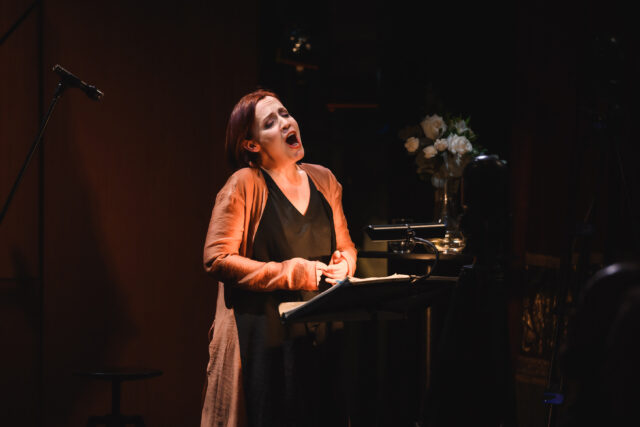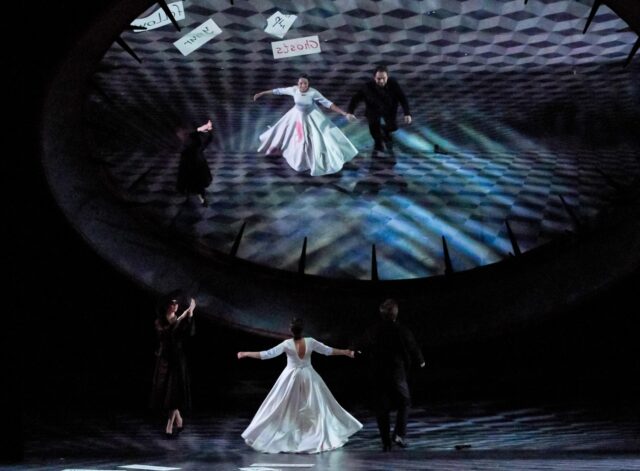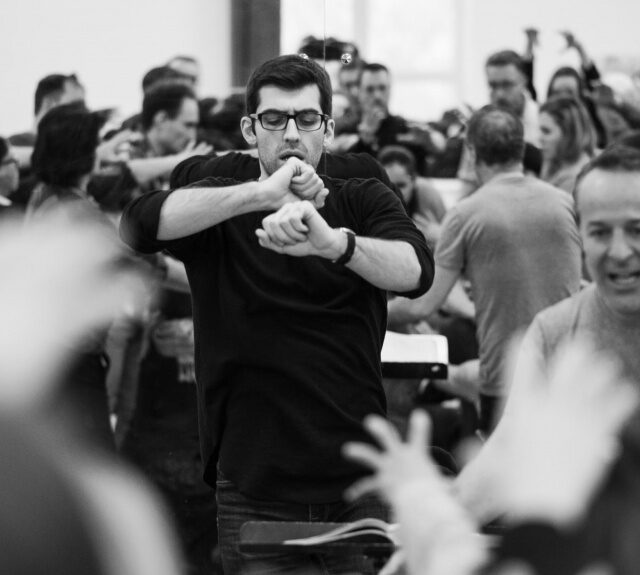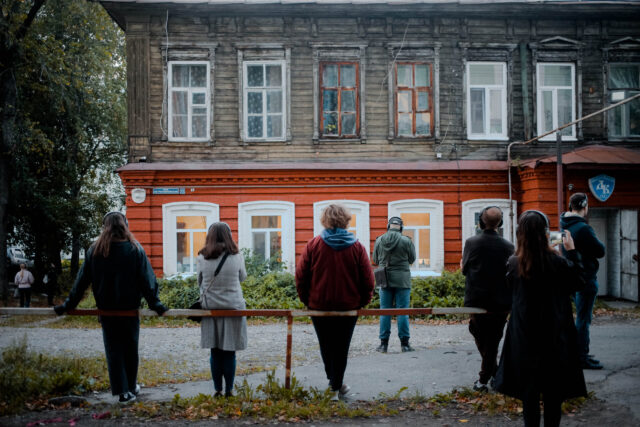The Diaghilev Festival opens in Perm tomorrow. It would be logical to talk about the programme, but this year it is so assured it seems to speak for itself, without the need for any comments or notes in the margins. So instead, let’s try to draw some early conclusions about this season, one of the most important events of which was the unreserved acceptance of the renewed Perm Opera by the Russian theatrical community. What do the four Golden Masks you took back to Perm a month ago mean to the theatre?
I remember we got together for the award ceremony with quiet confidence — the most important thing was the recognition of our work at the shortlist stage. With seventeen nominations, the Perm Opera and Ballet Theatre outperformed both the Mariinsky Theatre and the Bolshoi — what more could we wish for? And, of course, we were happy to be able to present ourselves commendably in the competition programme — the success of both Cosi Fan Tutte and Medeamaterial as well as the ballets, with theMoscow public, speaks volumes. As for the final distribution of awards — basically, almost all of our predictions came true, in fact we were even a little disappointed. I make no secret of the fact that our number one hope was that the prize for best female role would be deservedly won by Nadine Koutcher — a fantastic young singer, who, I would like to think, we, if not discovered, at least revealed to the world…
Awarding the prize to Koutcher seemed like quite a strong gesture: by working simultaneously on contemporary and early music, she is doing something that, in essence, none of her colleagues in Russia are doing, and the support for this anti-mainstream approach from the jury of the country’s principal theatrical award is, undoubtedly, worth a lot.
Nadine’s unique potential as a Baroque singer was discovered in Perm, so we have something to be proud of. Her solo recording of Jean-Philippe Rameau’s musicshould soon be released by Sony Classical, in the autumn she will sing one of the leading roles in our staging of Purcell’s The Indian Queen which is a coproduction with the Teatro Real inMadrid, and now there is the Golden Mask too. Returning to the competition results, I would like to point out an extremely important award for us — the special prize awarded to Alexey Miroshnichenko for developing the ballet company’s repertoire. This award was not for one particular production; rather it recognizes our approach to building a repertoire. This, in essence, is the most important aspect of theatre. Currentzis is constantly reiterating to the musicians that the theatre must not turn into a factory that produces works that follow a certain format or fit into a particular mould. We try to ensure that this does not happen even when we encounter insuperable obstacles — yesterday I discussed the repertoire plan with Teodor until four in the morning, and regretfully we have had to turn down many projects due to the theatre’s lack of funds.
You have just touched upon a whole knot of important issues and topics — let’s try to untangle them one by one. Topic number one is perhaps the most pressing, and is of interest to both Currentzis’ supporters and his critics alike. When Teodor and his musicians moved from Siberia to Perm two years ago, the principal question discussed in Moscow and St. Petersburg was basically: how long will he stay in Perm, and when will he finally move to the West? The majority of people assumed that his ‘Perm period’ would end in 2014, when the term of the grant provided by the Perm Territory government to fund the work of MusicAeterna comes to an end. But now, in May 2013, you are saying that Currentzis is planning the theatre’s repertoire for at least the next three years?
To nip all speculation on this matter in the bud, I would firstly like to say that Currentzis is not planning to leavePermfor anywhere. Full stop. It is true that this year we are approaching the end of the first three-year instalment provided for Teodor and MusicAeterna’s work inPerm. This summer the deputies of the local legislative assembly should confirm the next grant, and there are no reasons to suppose that the funding will be stopped or reduced. In addition, we are constantly repeating that the theatre’s funding needs to increase dramatically. I know I sound insolent, especially asPermTerritoryhas provided substantial funds for MusicAeterna, but the funding for all the other creative departments of the theatre has not changed — in other words, it is at rock bottom, which, understandably, has created tension between the theatre groups, something we have been trying to alleviate for a year. Furthermore, the budget for productions at the theatre has not increased — it has remained, there is no other word for it, modest. The situation, as you can see, has developed rather paradoxically: it seems thatPermhas a unique concentration of creative potential, but we do not have the funds to develop it.
Is that why strategically important projects for Perm Opera, in particular the world première of Nosferatu by Dmitry Kurlyandsky, staged by Theodoros Terzopoulos and Jannis Kounellis, have been postponed indefinitely?
Precisely. The première of Nosferatu has already been put back twice; God willing, it will finally take place next year. Literally yesterday, we had to postpone until 2014 a ballet première that we had wanted to show in the first half of the coming season. Sometimes we have to take quite extreme steps to save a particular project. A lack of funding threatened to disrupt the première of Romeo Castellucci’s The Rite of Spring. To ensure this coproduction with the Manchester International Festival went ahead anyway, Currentzis was forced to put in a significant sum of money from his own pocket.
The picture you paint differs quite emphatically from the stereotype which arises in the minds of the majority of our colleagues upon mention of the surname ‘Currentzis’ and the city ‘Perm’: we are used to hearing constantly about some incredible sum of money that has been used to realize the project.
This is how the figures break down: annual state funds provided to the theatre for production is RUB 55 million. With this money, we have to fulfil the government commission, in other words put on two operas, two ballets, and one children’s show. To offer this minimum programme, we must, as I said before, turn down many initiatives, or attract a similar amount of non-state funding, which we have managed to do successfully. I should say that for Perm Opera, this is an unprecedented situation — the theatre has never previously managed to attract such a large amount of sponsorship money. Thanks to that, last season we were able to show what we are capable of. But at the recent meeting with the Governor we openly and directly stated that to somehow continue this success, the theatre needs additional funding. Now we face an entirely new challenge — to perform as equal partners in joint productions withMadridandManchester. These and other plans we have require our budget to be at least doubled, which at the very least, would allow the theatre to stop constantly having to frantically search for money. Naturally, we also need funds to develop the ballet company, and the theatre’s second orchestra: in total, we are looking at a figure of RUB 150 million — a sum that is entirely consistent with the size of grants given out by the Russian President and Government, and which this year were awarded not only to national theatres, but regional theatres (such as the musical theatre in Rostov-on-Don) and city theatres (such as the Mikhailovsky Theatre in St. Petersburg) too.
It is curious that this year, grants were given to theatres with not so much as a whisper of artistic success in recent years.
Generally speaking, the issue of the effectiveness of theatrical production is not taken seriously by anyone in Russia. All the productions we put on last season ended up on the shortlist for the Golden Masks — surely that means something? I often think back to my work with the Earlymusic festival: for ten years Andrey Reshetin and I ran it using exclusively sponsorship money — at that point it seemed like a lot of money, but in actual fact it was not enough to do anything. But our creative policy and the message of the festival itself were so intelligent that they worked even with a paltry budget: I often hear that Earlymusic changed the Russian cultural landscape. To a certain extent the same situation, on a different scale, of course, is now repeating itself many years later inPerm.
Leaping ahead, let’s discuss the show with which Perm Opera is opening the upcoming season — the joint production of Henry Purcell’s The Indian Queen with Teatro Real.
I don’t think there is any need to explain the significance of this project: Peter Sellars, a guru of contemporary opera direction, and someone, as is often remarked in such circumstances, without whom contemporary musical theatre would be completely different, will be working in Russia for the first time. It is important to note that, unlike many of his colleagues who have worked in Russia, Sellars is not bringing a ready-prepared production to Perm, but rather will be creating a completely new show, as it were, ‘from scratch’.
Under what operating and financial conditions is this première being launched?
As with Romeo Castellucci’s The Rite of Spring in Manchester, the production with Teatro Real is being carried out on an equal footing — including the funding for the project. We divide all expenses between us, and with The Indian Queen, they are shared three ways, as we have just added another partner, English National Opera. In Madrid, put it this way, distribution costs are higher, because it is being performed there more times than in Perm. However, they granted us the right to the first night — the performance’s première will take place in Perm and only then move to Madrid. It is also setting a precedent in artistic terms: in Madrid, as in Perm, Currentzis will conduct MusicAeterna, and not the national orchestra of the Teatro Real, as might well have been the case.
Will the same singers perform the Purcell in Perm and Madrid?
We did the casting together, and included both Russian and European singers. Both in Permand Madrid, Nadine Koutcher will have one of the main roles. We are already preparing in parallel a second group of vocalists who will be able to sing The Indian Queen when the production returns to Perm and becomes a regular fixture on the repertoire. By the way, both of our co-productions will be well represented at festivals — we will take the Purcell to Wiener Festwochen, and The Rite of Spring to the Ruhrtriennale and the Holland Festival. Europeans, as Currentzis dreamed, will finally have to learn the name ‘Perm’.
What was the most important achievement for your team in preparing for the Diaghilev Festival?
Our gut feeling was that the last Diaghilev Festival was very successful, mostly because we managed to achieve the most important thing — the creation of a space where time passes in a totally different way from everyday life, where life feels more focused, and people are brought together. In this year’s programme we tried to put all the prerequisites in place to achieve this magical effect again.
Is the Diaghilev Festival Currentzis’ signature project, his creation?
Absolutely, 100%. Teodor, in my opinion, is a genius not only as a musician, but also as a producer. While preparing the festival programme, he had several marvellous flashes of inspiration. My job is to make sure that this inspiration somehow relates to the realistic possibilities afforded to the festival. I remember well how, having returned to Perm after a two week absence, I spent ten minutes crossing out a series of items from the poster that had been updated after a meeting with Currentzis, otherwise the cost of the festival would have more or less doubled. Incidentally, as a result of this operation we now already have the programme ready for the 2014 Diaghilev Festival, and I can even announce it: Les c (h)oeurs by Alain Platel, Kristina by Katie Mitchell, Le Poème Harmonique — and that is just the start.
Dmitry Renansky



